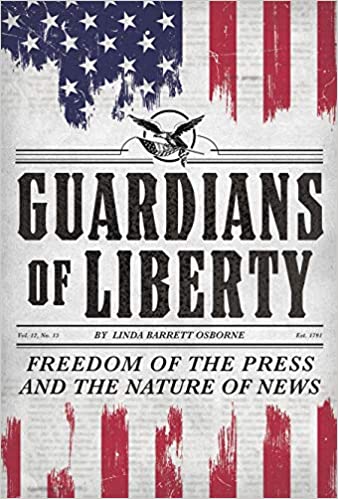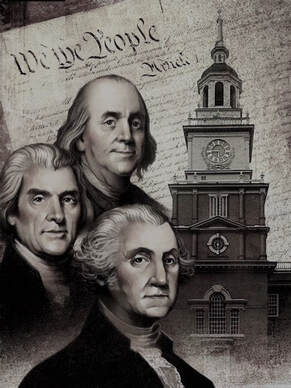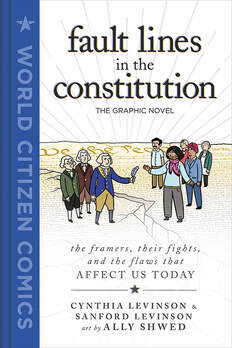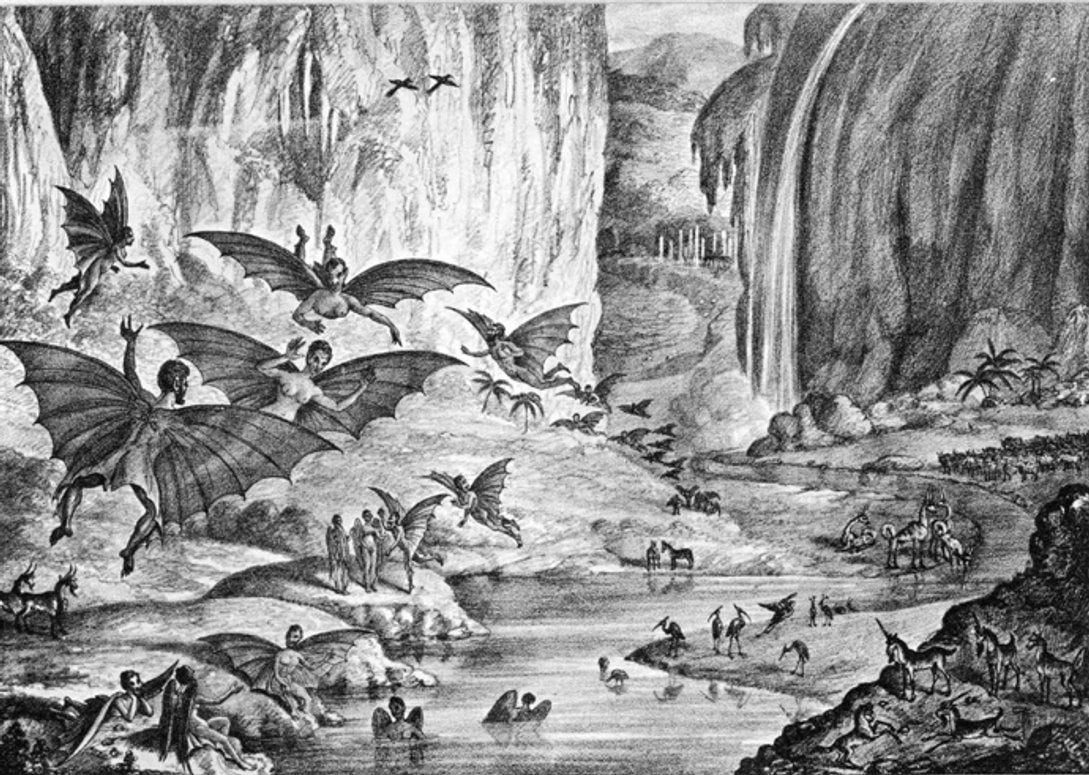Others see the Constitution as a living document to be interpreted in light of changing thought and circumstance. This view has brought us labor rights and protections, equal rights for people of all colors, persuasions and genders. It's brought us social security, Medicare and, so far, allowed the Affordable Care Act to stand.
To shed more light on the Constitutional debate, I've invited author and friend Cynthia Levinson to tell you about her new kids' book and graphic novel Fault Lines in the Constitution. Here's a new book you'll want to put in the hands of young people you care about. Guardians of Liberty: Freedom of the Press and the Nature of News takes an in-depth look at fake news. Though it has been several decades since I officially worked as a journalist, freedom of the press is bone deep in my body. So, I've invited author Linda Barret Osborn here today to tell us about her new book, including the part about people living on the moon!  Praise for the book— "Deeply researched and beautifully written, Guardians of Liberty enlightens and entertains readers of any age." — Michael Dirda, Pulitzer Prize-winning critic for the Washington Post Welcome, Linda. Tell us how you came to write this book. In 2017, I became alarmed at the way President Donald Trump was disparaging the press and questioning its validity. I had some knowledge of the First Amendment, which reads, in part, “Congress shall make no law . . . abridging the freedom . . . of the press.” But as with all my books for middle school and young adults, I learned a lot more about freedom of the press along the way than I knew at the beginning. It seemed important that young people understand how today’s issues are connected to the beginning of our history as a country. Actually, I wish more grownups understood this history too. One of the most delightful things I found in my research was that in 1835 the New York Sun reported that men were living on the moon. These were no ordinary men. “They averaged four feet in height, were covered . . . with short and glossy copper-colored hair, and had wings” like bats. Unicorns also roamed the moon. So did a strange kind of beaver that walked upright on two legs. The Sun explained that a respected South African astronomer had made the discovery using a huge telescope. New Yorkers rushed to buy the newspaper and read each day’s installment. When the story was revealed as a hoax—a great entertainment—sales of the Sun continued to rise. The Sun’s moon story was an example of actual fake news. The paper’s editor knew it was false when he published it. Fake news is not, as President Trump sees it, press about himself that he just doesn’t like.  By attacking journalists, by undercutting the idea of factual reporting, it seems that President Trump was going against the intentions of the Founding Fathers who wrote that amendment. Men like Benjamin Franklin, Thomas Jefferson, and James Madison envisioned a press that would be a watchdog against government abuses of power. Remember, they were reacting to the British royal government’s treatment of the colonies. They also believed that a democracy needs an active, vital press representing all points of view: a press that would encourage debate and open discussion of ideas to create an informed citizenry. Because Americans do hold widely differing points of view, no president can count on only “good” press. So from the early days of our country, the First Amendment put the president—no matter what his political party—and the press at odds with each other. No president likes negative press. Here was something else I wanted to explore and it soon became clear that combative, hurtful words about presidents are not new in our history. John Adams, Jefferson, Andrew Jackson, Abraham Lincoln, Woodrow Wilson, Richard Nixon, George W. Bush, and Barack Obama, as well as President Trump, have been ripped apart in the news. Even George Washington got bad press. Benjamin Franklin’s grandson wrote that Washington had encouraged “political iniquity and . . . legalized corruption." Sometimes the presidents remained silent. Sometimes they fought back against their critics. Sometimes they let partisan newspapers fight it out for them. But by 2017, the “press” did not just include printed papers. Radio, television, the internet, and social media had all changed the way the news was delivered. And because the technology had changed, President Trump could bypass the press, using social media directly to reach the public. He could continually attack the press as often as he wished, tweeting many times a day. Since I wrote Guardians of Liberty, people have asked me why I think Trump is different from other presidents and their attitudes towards the press. Nixon, after all, called the press “the enemy.” But only Trump has called the press “the enemy of the people." "Don’t believe the crap you see from these people—the fake news,” he said to a VFW convention, pointing to the reporters. “What you’re seeing and what you’re reading is not what’s happening.” I think all press, no matter what the medium, has its biases.  Author Linda Barrett Osborne Author Linda Barrett Osborne In addition, more Americans get their news from social media. Much of that “news” is opinion. Some of it is definitely fake, though not in the way President Trump defines it. So we all need to become better judges of the accuracy of what we are reading. In many ways, professional journalists, who have a standard of accuracy, are our best bet. But there are fairly easy ways to check anyone’s sources and statements. Tweets, press briefings, and speeches are on record. They are filmed and recorded. The White House itself posts the transcripts of speeches, so you can see what the president actually said and if and when he said the opposite. Since the mid-twentieth century, the Supreme Court cases on press freedom I covered in my book have tended to uphold the First Amendment. The need for national security during war has been the biggest challenge to this freedom. New technology has changed the nature of news. It should not change our belief in the importance of free expression in a democracy, the same belief the Founding Fathers held. I think we are at a turning point. We can agree that disparaging and attacking the foundations of one of our most precious freedoms is acceptable; or we can believe, as a society, that freedom of the press is a principle we need to defend, practice, and value. Thanks so much, Linda! I'm going to be giving away several copies of Linda's book to middle school teachers. Sign up for my weekly newsletter to stay in the loop and find out how you can win. |
I'm fascinated to discover little-known history, stories of people and events that provide a new perspective on why and how things happened, new voices that haven't been heard, insight into how the past brought us here today, and how it might guide us to a better future.
I also post here about my books and feature other authors and their books on compelling and important historical topics. Occasionally, I share what makes me happy, pictures of my garden, recipes I've made, events I've attended, people I've met. I'm always happy to hear from readers in the blog comments, by email or social media. Archives
September 2023
Categories
All
|



